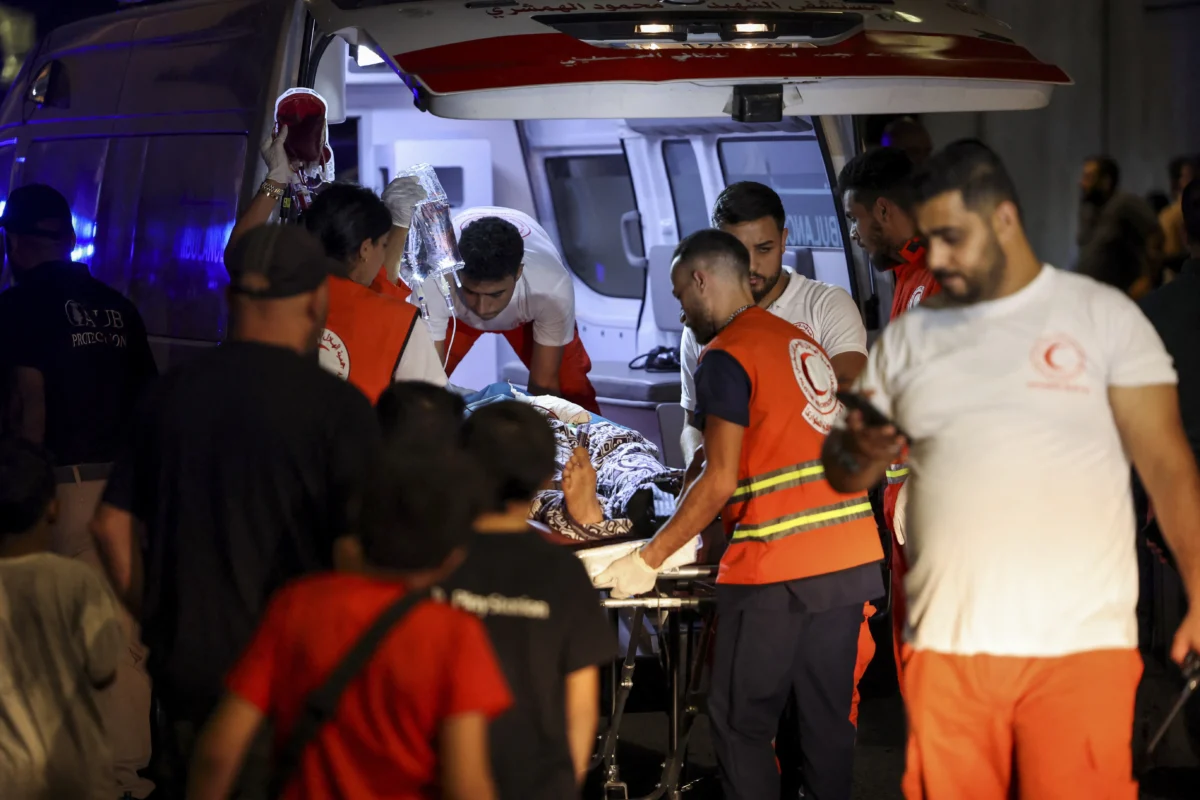In the wake of this week’s exploding pager and walkie-talkie attacks, Israel and Hezbollah intensified their border war on Sept. 19, stopping short of a total ground war.
Israeli jets and artillery hit multiple targets in southern Lebanon during the night, while Hezbollah fired a new barrage into northern Israel on Thursday.
The Israel Defense Force (IDF) reported hitting Hezbollah targets in six Lebanese towns, as well as a Hezbollah weapons storage facility near Khiam. Lebanese security sources said there were dozens of strikes across south Lebanon in some of the most intense bombings since the Oct. 7, 2023, war began.
Israeli media reported that Hezbollah anti-tank missiles wounded a number of civilians, but there was no official confirmation. One reportedly hit a vehicle, injuring several people who were treated at a Haifa hospital.
Hezbollah fired around 20 projectiles into Israel’s north, plus another 10 at its Mount Hermon base in the Golan Heights, which has espionage, surveillance, and air defense installations.
On Tuesday, as Hezbollah members attempted to use their pagers, they exploded, killing nine and wounding more than 2,800.
Many were in the terrorist group’s stronghold in Beirut’s southern suburbs. People elsewhere in Lebanon and some in Syria were struck as well. Victims included the Iranian ambassador to Lebanon and the sons of some prominent Hezbollah leaders.
A second wave of blasts, involving handheld radios, took place on Wednesday, resulting in around 25 people being killed and several hundred wounded.
Israel has not commented upon nor taken credit for the device attacks. Security experts say the attack was likely mounted either by Israel’s Mossad spy agency or by Unit 8200, the IDF’s secretive high-tech unit.
Some speculate the devices’ batteries were deliberately overloaded, causing them to explode. Others deem the blasts too powerful and suggest it was more likely done with 20 to 50 grams of plastic explosive. Many victims had fingers blown off, were blinded as they lifted the devices to read them, or suffered injuries near their midsection and beltline.
Jets flew low over Beirut on Thursday, causing sonic booms during a speech by Hezbollah leader Hassan Nasrallah.
The war of words intensified as well. Nasrallah called the pager and walkie-talkie attacks “a terrorist act” and a declaration of war against Lebanese sovereignty and its people. He dared Israel to attack.
“Israel’s foolish Northern Command leader talks about a security zone inside Lebanese territory. We are waiting for you to enter Lebanese territory,” Nasrallah said in a televised address.
“We are waiting for your tanks, and we will see this as a historic opportunity.”

Nasrallah said he’d been in touch with the Israeli government.
“On Tuesday, I received messages from Israel to stop the attacks,” he said. “Otherwise, there would be another strike on Wednesday.”
He said the only way Hezbollah attacks would stop and for Israeli residents to return home is “to stop the aggression on the Gaza Strip and the West Bank.”
The IDF said Hezbollah “has turned southern Lebanon into a combat zone. For decades, Hezbollah has weaponized civilian homes, dug tunnels beneath them, and used civilians as human shields.”
Israel’s leaders now formally list reclaiming the country’s north as a war goal. That would allow thousands of residents to go home. They had to be evacuated because of Hezbollah’s rocket attacks after the start of the Oct. 7, 2023, war. The terrorist group has kept up the bombardment nearly every day since.
Israel’s leaders, while under international pressure not to escalate the fighting, have said they’ll do whatever it takes to secure the north. One of Israel’s crack army units, the 98th Division, made up of elite commandos and paratroopers, has been transferred from Gaza to the northern front. It spearheaded the fighting in Khan Yunis.
While daily fighting has escalated multiple times between Israel and Hezbollah, they have been careful to avoid an all-out war.
That may be changing.
“You don’t do something like that, hit thousands of people, and think war is not coming,” said retired Israeli Brig. Gen. Amir Avivi, who leads the Israel Defense and Security Forum, a group of hawkish former military commanders.
“Why didn’t we do it for 11 months? Because we were not willing to go to war yet. What’s happening now? Israel is ready for war.”
“The mission is clear,” said Maj. Gen. Ori Gordin, head of Israel’s Northern Command. “We are determined to change the security reality as soon as possible.”
A late August poll by the Israel Democracy Institute, a Jerusalem think tank, found that 67 percent of Jewish respondents thought Israel should intensify its response to Hezbollah. Forty-six percent believed Israel should launch a deep offensive striking Lebanese infrastructure, and 21 percent preferred an intensified response stopping short of that.
“There’s a lot of pressure … to go to war and win,” said Avivi. “Unless Hezbollah tomorrow morning says, ‘OK, we got the message. We’re pulling out of south Lebanon,’ war is imminent.”
From The Epoch Times
